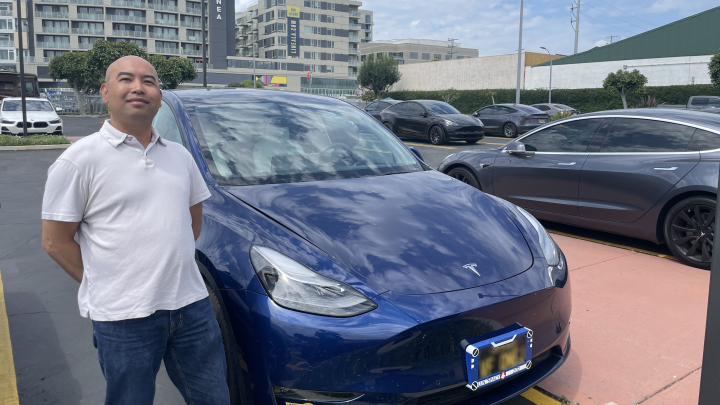
EVs have made big inroads in California. But why do most car buyers go with gas?
EVs have made big inroads in California. But why do most car buyers go with gas?

California boasts the highest number of registered electric cars, and 1 in 4 new vehicles sold there last quarter were electric. But that means three times as many Californians who bought new vehicles stuck with gasoline.
For a lot of higher-income people, becoming an EV driver is kind of a no-brainer. That’s how it was for Joey Gil, a research scientist who’s owned his Tesla for five years.
“I’ve always been, like, an early adopter and a bit of a techie,” he said. “Once I test drove it, it was just really nice.”
Most of those new EVs are parked in front of households with high incomes. There are many in West Los Angeles, where Gil works. So why do drivers like him drive EVs?
For one thing, concern about climate change. “We do care about reducing carbon footprint,” he said.
The other big reason? EVs are cheaper to drive. If owners can get past the higher price tag upfront, EVs tend to save them money in the long run on gas and maintenance.
In 2021, Tiffiny Gage went all in on electric. She replaced her family’s two gasoline vehicles with Teslas. That’s partly because the gas bill was so high with her husband’s 100-mile daily commute.
“Definitely the financial piece was a motivator,” she said. “The fact that my husband was commuting, it only made sense that we go electric. … We’d be spending $10,000-plus in gas a year.”
Both Gage and Gil own their houses. They installed EV chargers at home and even put solar panels on their roofs to make charging their cars more affordable.
But L.A. neighborhoods that have low EV-adoption rates tend to have more renters who often can’t charge at home. Plus, those places tend to have fewer public car chargers.
Take Ana Meni, who lives in the city of Carson in south L.A. County. She said she’s sticking with her gas-powered Toyota Camry because in her city, it’s more convenient.
“I can go around every single block and find a gas station. I can’t find charging stations,” Meni said.
There is money set aside in the Inflation Reduction Act to help pay for more. But it’ll take a while for those federal dollars to get to the local level and those chargers to come online.
She said the other big barrier is the higher sticker price of an EV. “What they deem ‘affordable’ electric vehicles are starting at the $30,000 range,” she said.
Combine that with interest rates at their highest levels in 15 years, and the cost is just not doable for a lot of car buyers.
California does have a program to help low-income drivers buy EVs. But the funding has almost dried up, and there’s a waitlist for what little money is left.
Plus, even if affording the EV and finding a charger near home isn’t a problem, the last major barrier is as old as EVs themselves: range anxiety.
Susan Lowry of Lancaster, California, worries that she’ll get stranded on the road. She’s retired and loves to go camping in her gas-powered Ford F-150. “We don’t go places where things are easily found. I mean, next summer’s big trip is going to be to Alaska,” she said.
Funding for chargers in rural and low-income areas is included in the Inflation Reduction Act. Even if that takes a while, Lowry said, she knows she should make the switch. She thinks it’s the right thing to do. And if she has to give up some of her favorite drives, she’s willing to do that.
“It’s all about sacrifice,” she said.
There’s a lot happening in the world. Through it all, Marketplace is here for you.
You rely on Marketplace to break down the world’s events and tell you how it affects you in a fact-based, approachable way. We rely on your financial support to keep making that possible.
Your donation today powers the independent journalism that you rely on. For just $5/month, you can help sustain Marketplace so we can keep reporting on the things that matter to you.

















